外研版(2019)选择性必修 第四册 Unit 4 Everyday economics Developing ideas Writing 课件(共17张)
文档属性
| 名称 | 外研版(2019)选择性必修 第四册 Unit 4 Everyday economics Developing ideas Writing 课件(共17张) |
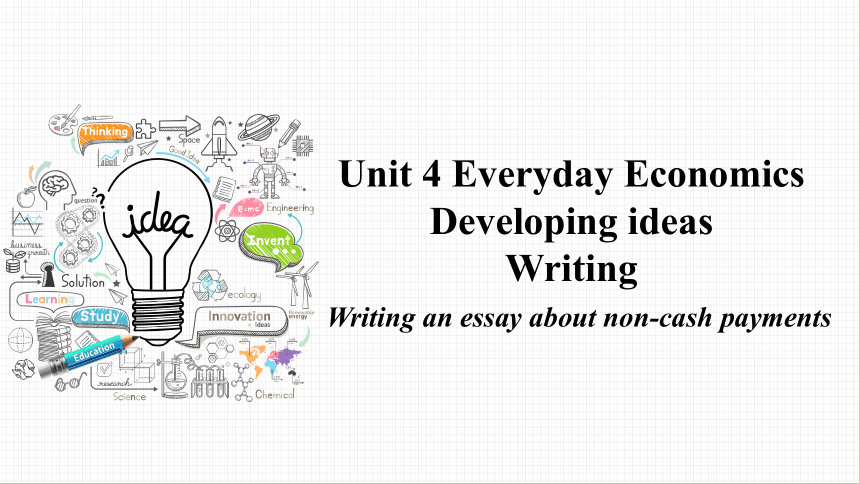
|
|
| 格式 | pptx | ||
| 文件大小 | 1.0MB | ||
| 资源类型 | 教案 | ||
| 版本资源 | 外研版(2019) | ||
| 科目 | 英语 | ||
| 更新时间 | 2025-05-02 00:00:00 | ||
图片预览

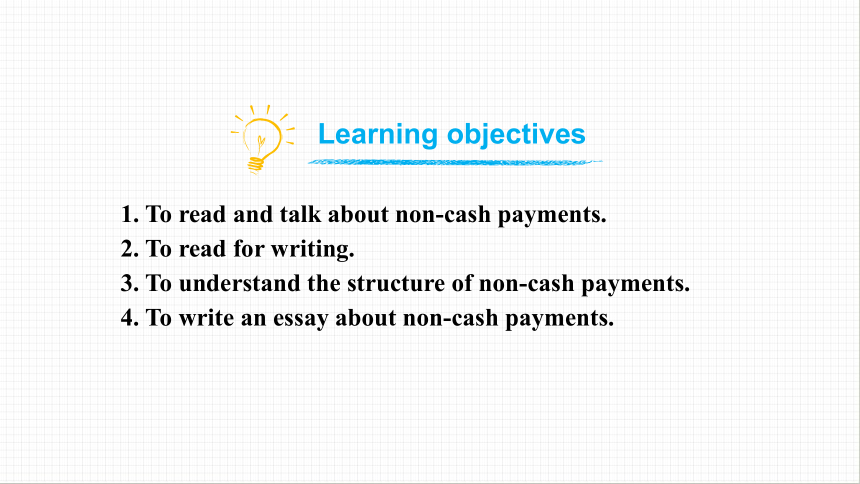
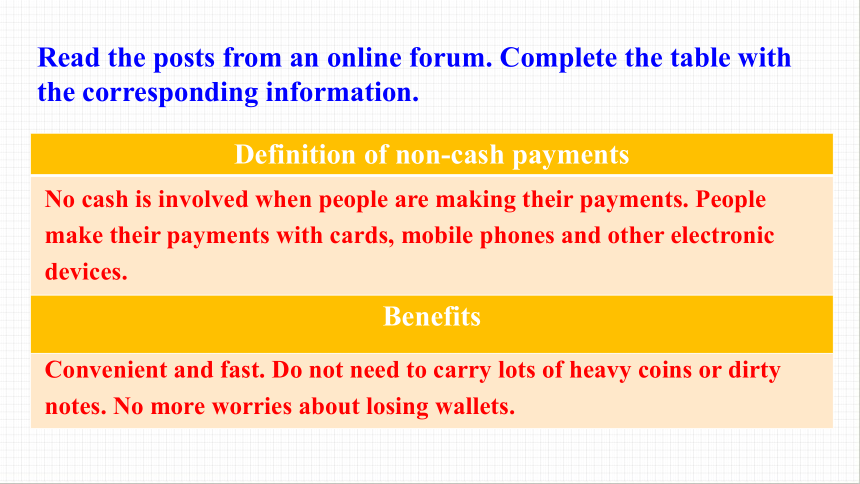
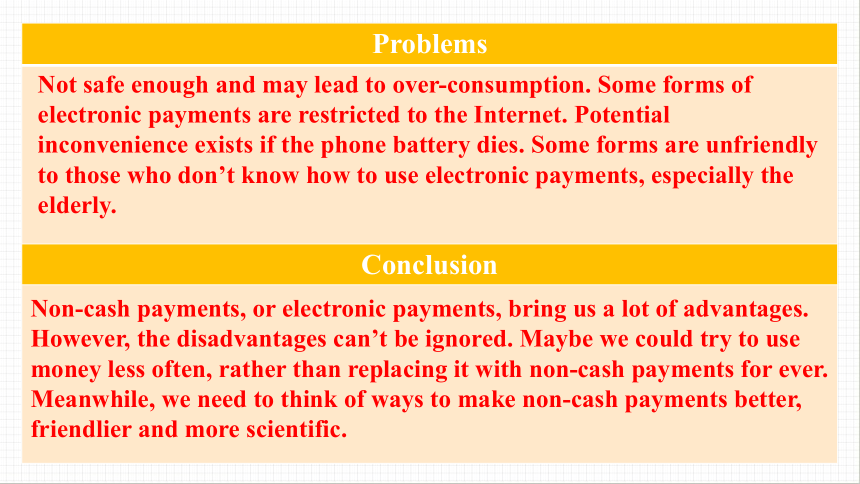

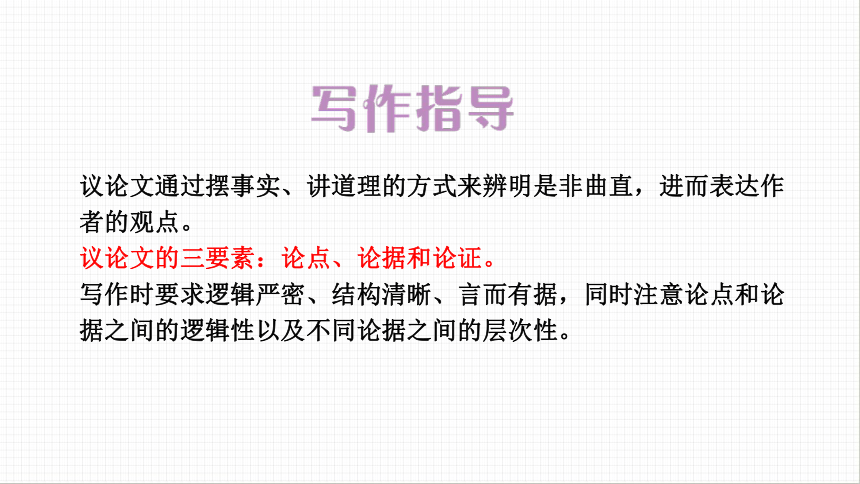
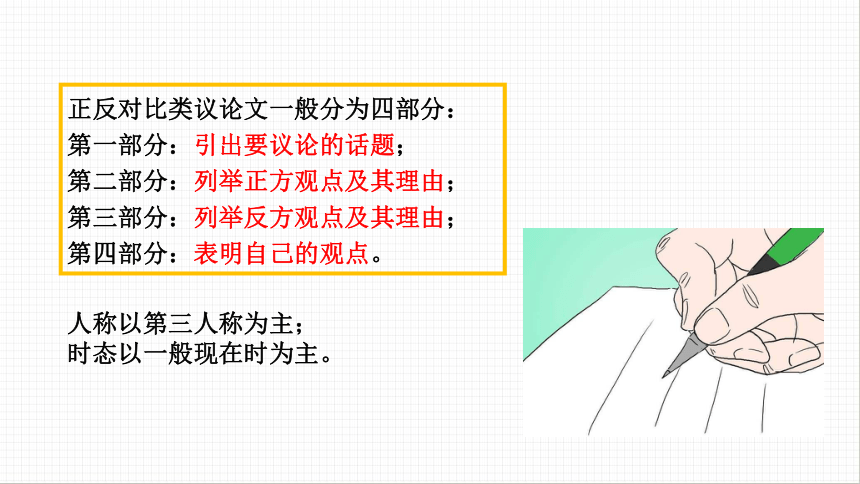
文档简介
(共17张PPT)
Writing an essay about non-cash payments
Unit 4 Everyday Economics
Developing ideas
Writing
1. To read and talk about non-cash payments.
2. To read for writing.
3. To understand the structure of non-cash payments.
4. To write an essay about non-cash payments.
Learning objectives
Read the posts from an online plete the table with the corresponding information.
Definition of non-cash payments
Benefits
No cash is involved when people are making their payments. People make their payments with cards, mobile phones and other electronic devices.
Convenient and fast. Do not need to carry lots of heavy coins or dirty notes. No more worries about losing wallets.
Problems
Conclusion
Not safe enough and may lead to over-consumption. Some forms of electronic payments are restricted to the Internet. Potential inconvenience exists if the phone battery dies. Some forms are unfriendly to those who don’t know how to use electronic payments, especially the elderly.
Non-cash payments, or electronic payments, bring us a lot of advantages. However, the disadvantages can’t be ignored. Maybe we could try to use money less often, rather than replacing it with non-cash payments for ever. Meanwhile, we need to think of ways to make non-cash payments better, friendlier and more scientific.
Write an essay about non-cash payments using the information in Activity 6 and the words and expressions in this section to help you.
introduction
advantages
disadvantage
conclusion
body
beginning
ending
议论文通过摆事实、讲道理的方式来辨明是非曲直,进而表达作者的观点。
议论文的三要素:论点、论据和论证。
写作时要求逻辑严密、结构清晰、言而有据,同时注意论点和论据之间的逻辑性以及不同论据之间的层次性。
正反对比类议论文一般分为四部分:
第一部分:引出要议论的话题;
第二部分:列举正方观点及其理由;
第三部分:列举反方观点及其理由;
第四部分:表明自己的观点。
人称以第三人称为主;
时态以一般现在时为主。
Different students had / held different opinions.
... had different attitudes towards this topic.
Opinions vary on this topic.
There were different opinions among ... concerning this topic.
Some of them thought ... could be very ...
Some students agreed with the idea.
For one reason, ... For another reason, ...
Some students in favour of the idea thought ...
Besides / What's more /In addition, they believed/held a belief ...
However, other students didn't agree / held a different view.
They thought ...
Besides, ..
On the contrary, others were against it.
They argued that ...
What's worse, ...
I agree with ...
In my opinion, ...
Personally / As for me, I'm for ...
As far as I'm concerned, I'm in favour of ...
Nowadays, non-cash payments are becoming more and more popular across the world, especially in China. It refers to the method of making payments with cards, mobile phones and other electronic device. New ways of supporting non-cash payments are quickly turning up one after another.
Beginning
Obviously, there are many benefits of non-cash payments. First, they are so convenient and fast that people could make almost all the payments with a single click on their smartphones. In some shopping centres, they can pay by simply standing in front of a camera and let it recognise their face. Second, non-cash payments are safe and hygienic. They free people from carrying heavy coins and dirty notes, or even a wallet. Therefore, the risk of losing money or the wallet is not a threat any more. What is more, non-cash payments eliminate the risk of counterfeit money.
Body-advantages
However, as the old saying goes, every coin has two sides, and so does the non-cash payments, even though they don't require a coin. The problems that accompany non-cash payments should not be ignored. When thinking it further, non-cash payments might not be quite safe as people have assumed, as it is not that hard for hackers to access people's bank account and steal the money. It's also easier for your personal information to be stolen, which may bring great trouble. Meanwhile, to some degree, non-cash payments encourage over-consumption.
Body-disadvantage
They also depend too much on the Internet access or battery capacity -- just imagine being at a place with no wi-fi and a flat battery, how can people make payments via their computers or smartphones then Last but not least, non-cash payments aren't quite friendly with people not knowing how, especially the elderly. It is such a pity to make them feel excluded and left out.
Body-disadvantage
Nonetheless, non-cash payments are increasingly part of our fast-growing modern society. The current trend is for more non-cash payments, and this trend will probably continue in the future. But embracing a new trend doesn't mean to exclude the “old-fashioned” ways. Perhaps it is more convenient for everyone - young and old, men and women - to have various options, in both cash and non-cash forms, when it comes to making payments, for the better good.
Ending
Make improvements to each other’s essays and share them with the class.
最近你班对“中学生是否有必要学习理财?”这一话题展开了讨论,请你根据所给提示写一篇英语短文介绍讨论结果,并表明你的看法,然后发表在你校英文论坛上。
正方 1. 有助于学生理解父母赚钱的不易;
2. 从小养成正确的消费观。
反方 1. 零花钱很少,没有必要理财;
2. 学生应该把精力用在学习上。
你的看法 ……
1. 词数100左右;
2. 可适当增加细节,以使行文连贯。
3. 参考词汇:理财money management 消费观view of consumption
Homework
Recently, our class had a heated discussion about whether it is necessary for students to learn money management. We have different opinions.
Some think it's necessary. First, it helps students better understand how difficult it is for parents to earn money. Besides, it helps them to develop a correct view of consumption, which will benefit their future life. However, others disagree. For one thing, they have so little pocket money that they needn't learn how to manage it. For another, they should focus more on their lessons.
As for me, I think it is necessary because only when we have the ability to control a small amount of money can we manage more wealth in the future.
Writing an essay about non-cash payments
Unit 4 Everyday Economics
Developing ideas
Writing
1. To read and talk about non-cash payments.
2. To read for writing.
3. To understand the structure of non-cash payments.
4. To write an essay about non-cash payments.
Learning objectives
Read the posts from an online plete the table with the corresponding information.
Definition of non-cash payments
Benefits
No cash is involved when people are making their payments. People make their payments with cards, mobile phones and other electronic devices.
Convenient and fast. Do not need to carry lots of heavy coins or dirty notes. No more worries about losing wallets.
Problems
Conclusion
Not safe enough and may lead to over-consumption. Some forms of electronic payments are restricted to the Internet. Potential inconvenience exists if the phone battery dies. Some forms are unfriendly to those who don’t know how to use electronic payments, especially the elderly.
Non-cash payments, or electronic payments, bring us a lot of advantages. However, the disadvantages can’t be ignored. Maybe we could try to use money less often, rather than replacing it with non-cash payments for ever. Meanwhile, we need to think of ways to make non-cash payments better, friendlier and more scientific.
Write an essay about non-cash payments using the information in Activity 6 and the words and expressions in this section to help you.
introduction
advantages
disadvantage
conclusion
body
beginning
ending
议论文通过摆事实、讲道理的方式来辨明是非曲直,进而表达作者的观点。
议论文的三要素:论点、论据和论证。
写作时要求逻辑严密、结构清晰、言而有据,同时注意论点和论据之间的逻辑性以及不同论据之间的层次性。
正反对比类议论文一般分为四部分:
第一部分:引出要议论的话题;
第二部分:列举正方观点及其理由;
第三部分:列举反方观点及其理由;
第四部分:表明自己的观点。
人称以第三人称为主;
时态以一般现在时为主。
Different students had / held different opinions.
... had different attitudes towards this topic.
Opinions vary on this topic.
There were different opinions among ... concerning this topic.
Some of them thought ... could be very ...
Some students agreed with the idea.
For one reason, ... For another reason, ...
Some students in favour of the idea thought ...
Besides / What's more /In addition, they believed/held a belief ...
However, other students didn't agree / held a different view.
They thought ...
Besides, ..
On the contrary, others were against it.
They argued that ...
What's worse, ...
I agree with ...
In my opinion, ...
Personally / As for me, I'm for ...
As far as I'm concerned, I'm in favour of ...
Nowadays, non-cash payments are becoming more and more popular across the world, especially in China. It refers to the method of making payments with cards, mobile phones and other electronic device. New ways of supporting non-cash payments are quickly turning up one after another.
Beginning
Obviously, there are many benefits of non-cash payments. First, they are so convenient and fast that people could make almost all the payments with a single click on their smartphones. In some shopping centres, they can pay by simply standing in front of a camera and let it recognise their face. Second, non-cash payments are safe and hygienic. They free people from carrying heavy coins and dirty notes, or even a wallet. Therefore, the risk of losing money or the wallet is not a threat any more. What is more, non-cash payments eliminate the risk of counterfeit money.
Body-advantages
However, as the old saying goes, every coin has two sides, and so does the non-cash payments, even though they don't require a coin. The problems that accompany non-cash payments should not be ignored. When thinking it further, non-cash payments might not be quite safe as people have assumed, as it is not that hard for hackers to access people's bank account and steal the money. It's also easier for your personal information to be stolen, which may bring great trouble. Meanwhile, to some degree, non-cash payments encourage over-consumption.
Body-disadvantage
They also depend too much on the Internet access or battery capacity -- just imagine being at a place with no wi-fi and a flat battery, how can people make payments via their computers or smartphones then Last but not least, non-cash payments aren't quite friendly with people not knowing how, especially the elderly. It is such a pity to make them feel excluded and left out.
Body-disadvantage
Nonetheless, non-cash payments are increasingly part of our fast-growing modern society. The current trend is for more non-cash payments, and this trend will probably continue in the future. But embracing a new trend doesn't mean to exclude the “old-fashioned” ways. Perhaps it is more convenient for everyone - young and old, men and women - to have various options, in both cash and non-cash forms, when it comes to making payments, for the better good.
Ending
Make improvements to each other’s essays and share them with the class.
最近你班对“中学生是否有必要学习理财?”这一话题展开了讨论,请你根据所给提示写一篇英语短文介绍讨论结果,并表明你的看法,然后发表在你校英文论坛上。
正方 1. 有助于学生理解父母赚钱的不易;
2. 从小养成正确的消费观。
反方 1. 零花钱很少,没有必要理财;
2. 学生应该把精力用在学习上。
你的看法 ……
1. 词数100左右;
2. 可适当增加细节,以使行文连贯。
3. 参考词汇:理财money management 消费观view of consumption
Homework
Recently, our class had a heated discussion about whether it is necessary for students to learn money management. We have different opinions.
Some think it's necessary. First, it helps students better understand how difficult it is for parents to earn money. Besides, it helps them to develop a correct view of consumption, which will benefit their future life. However, others disagree. For one thing, they have so little pocket money that they needn't learn how to manage it. For another, they should focus more on their lessons.
As for me, I think it is necessary because only when we have the ability to control a small amount of money can we manage more wealth in the future.
